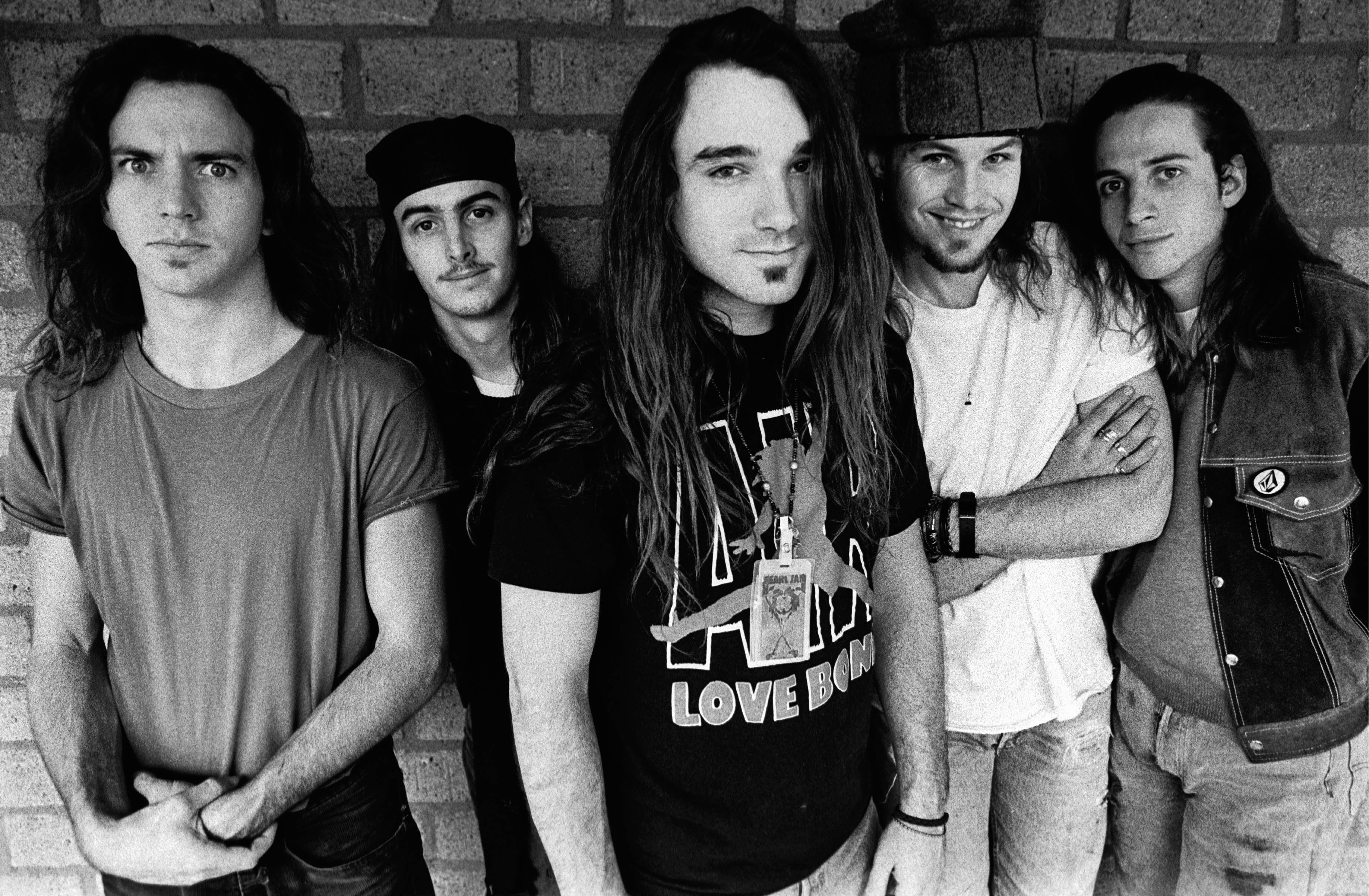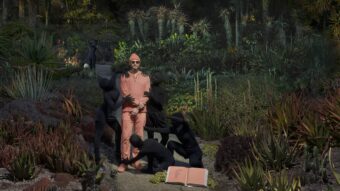More than almost any other non-jam band, you could argue that Pearl Jam doesn’t really have “deep cuts.” They’re all hits. As anyone can attest who’s attended a show by the grunge-pioneers-turned-classic-rockers, their entire catalog is fair game, and the band seems to particularly delight in pulling off songs you didn’t think were on the table; Eddie Vedder’s strapped on an accordion for “Bugs,” for instance. They cover anything and everything: Neil Young, Public Image Ltd., Johnny Cash, Buzzcocks, Split Enz, The Who. And because they obsessively document themselves and happen to be millionaires, you can buy any of their legitimate hundreds of live albums to hear it all, how something that seemed like a throwaway on a minor album can sneak up on you or get an extra burst of applause between “Even Flow” and “Dissident” in the set.
Furthermore, there isn’t any other multi-platinum rock band with so many fluke hits that differ exponentially from the officially released singles. “Better Man,” the best-known hit from 1994’s Vitalogy, was not one of its singles, nor was “Corduroy,” the band’s all-time most-played live song. The likelihood you’ve even heard one of the official singles (“Spin the Black Circle,” “Not for You,” “Immortality”) on the radio is low. Same with 1993’s “Animal,” a standard-issue rocker from Vs. that was officially released, while “Elderly Woman Behind the Counter in a Small Town,” (which you know every word of) wasn’t. Can you guess whether “Oceans” or “Black” was one of Ten’s singles? Because it won’t be the epic that AOR (album-oriented rock) fans have committed to memory. The deep cut “In Hiding” got as much airplay in some regions as anything else from Yield; one-off 1995 single “I Got Shit” more than anything from 1996’s No Code. And finally, two B-sides ended up setting the world on fire: “Yellow Ledbetter,” a classic power ballad with no real lyrics, improvised entirely by Vedder in the studio and a fan-club single covering J. Frank Wilson’s “Last Kiss,” which peaked at No. 2 on the Hot 100 and is now Pearl Jam’s biggest hit.
To celebrate this week’s release of Gigaton, Pearl Jam’s first studio album in seven years, here are 25 of their greatest songs that wouldn’t qualify as any kind of hit; sorry “Black,” “Corduroy,” “In Hiding,” you’re just too popular. And sorry to the gorgeous No Code epic “Off He Goes,” a single’s still a single even if it flops.
“Once” (Ten, 1991)
The opening track on Pearl Jam’s biggest and heaviest album remains one of the band’s biggest and heaviest. Hinging on a snake-charming lead from Mike McCready, “Once” revealed grunge to have other flavors besides sludged-down slacker-punk. Nirvana didn’t groove, for instance. This actually had some funk in it, as did the smash “Even Flow,” briefly placing PJ comfortably in between Jane’s Addiction and the Red Hot Chili Peppers on AOR formats.
“Release” (Ten, 1991)
The two finest non-hits on Ten are its bookends, and betraying Vedder’s extreme Pete Townshend influence, he even had his miniature rock opera, “Once,” “Alive,” and “Footsteps,” an Oedipal trilogy dubbed “Mamasan.” But Ten’s plaintive, swelling closer “Release” was no story; you can hear him coming to grips with never knowing his father in real life. It’s the emotional core of Ten’s success, the reason the millions of people didn’t just buy the record but gave this unusually empathetic quintet of arena-rockers their full attention for half the ‘90s.
“Rearviewmirror” (Vs., 1993)
This one is kind of a cheat; they named their greatest-hits comp after it. But it also exemplifies why there’s no better band for a list like this. Yes, “Rearviewmirror” got a little airplay. It’s also undeniably a deep cut that simply developed a life of its own, a word-of-mouth live epic that builds from a pulsing motorik pattern to one of their most intense codas. More than any other Pearl Jam album, vs. deals with toxic human connections: domestic violence on “Go,” police brutality on “W.M.A.,” parental abuse on “Daughter.” Even the Skynyrd-esque twang of “Dissident” details the monumental cowardice of a woman who falls in love with a fugitive but ultimately turns him in to the Gestapo. Like “Release,” only faster and more cathartic, “Rearviewmirror” resonated with fans as the great escape, the song that made driving away from their demons seem possible. Its “hit” status” was sheer force of will, and naming Pearl Jam’s best-of after a deep cut is all too fitting.
“Blood” (Vs., 1993)
Speaking of catharsis, Pearl Jam have plenty of tantrums that just stomp in place and require no further explanation. “Blood” is a nailbomb of a riff, divided up by Shaft-theme wah-wah stutters in the verses while Vedder shrieks about having his humanity ripped from him in somewhat of an anti-fame motif he’d go on to explore more articulately the next year on Vitalogy. There’s not much to it and that’s all it needs.
“Leash” (Vs., 1993)
The most underrated song on vs. is rarely pulled out live even for them, probably because it’s pretty immature. If parts of Ten resembled Tommy, “Leash” is closer to “Another Brick in the Wall Part II”; the message is essentially, “Hey, parent, leave those kids alone.” Except in 1993, you said, “Drop the leash / Get out of my fucking face.”
 Paul Bergen/Redferns
Paul Bergen/Redferns
“Nothingman” (Vitalogy, 1994)
Another fan-favorite of such clout that they put it on the ballad disc of their best-of, “Nothingman” was never a single, garnered rare airplay if any at all and just happens to be one of the simplest and loveliest tunes Pearl Jam has ever released. If Vitalogy’s A&R priorities weren’t so bizarre, one could make the case that it wasn’t pushed to radio programmers only because nine or 10 other Pearl Jam songs were already saturating the market. Why was the funereal “Immortality” pushed by Epic instead of this? Someone hearing “Nothingman” for the first time via the hits comp may not even notice it’s new to them, the song sounds like you’ve known it forever.
“Satan’s Bed” (Vitalogy, 1994)
For all of Vitalogy’s anti-fame screeds, “Satan’s Bed” is the funniest. The literal whip-cracks at the beginning and the title might hint at a puritanical anti-sex rant from the guys who found Ticketmaster too appalling, but it goes even further by chanting “already in love!” on a chorus that could be mocking the shack-ups of overnight celebrities or maybe even Vedder’s own sudden sex-symbol status in America. And it’s not for nothing that they gave this one a raunchy, Toys in the Attic-era Aerosmith groove.
“Long Road” (Merkin Ball, 1995)
Recorded with Neil Young for his middling Mirror Ball album, the sessions’ two best tracks were forbidden for an album release by meddling labels, so they became the two-track single Merkinball instead. The haunted rocker “I Got Shit” (“I Got Id” on the back cover) you know, this gracefully solemn dirge you may not. It was a perfect fit for the Dead Man Walking soundtrack though, where an appearance by late Qawwali legend Nusrat Fateh Ali Khan lifted it even higher.
“In My Tree” (No Code, 1996)
All of No Code is a deep cut, really. It’s also the band’s loosest and maybe even finest album, with a mix of kitschy worldbeat (the gorgeously gospel-inflected, self-sabotaging single “Who You Are”), big chunks of Neil Young influence on both the rockers (“Red Mosquito”) and ballads (“Off He Goes”), which were more ragged and folksy, respectively. “In My Tree” is one of its most striking tunes, marrying the Burundi-influenced “Bo Diddley” variations of Bow Wow Wow with U2’s reverberating anthemicity (a nonexistent word that deserves coining in a Pearl Jam piece). Enter Jack Irons’ polyrhythmic drumming, which may have been the secret to Pearl Jam’s most artistically rewarding period stretching to Yield as well.
“Smile” (No Code, 1996)
That Crazy Horse thud is in full-force on “Smile,” and it even incorporated bluesy harmonica. Like Smashing Pumpkins’ “Mayonaise,” this one has a gigantic slo-mo quality to it, made all the more poignant by one of their most emotional choruses to avoid radio completely: “I miss you already / I miss you always.”
 Stephen Lovekin/Getty
Stephen Lovekin/Getty
“Present Tense” (No Code, 1996)
No Code rocks — “Hail, Hail,” “Lukin,” “Mankind” and “Habit” are all as bruising anything on Vs. or Vitalogy — but its barnburners are admittedly so streamlined that they become a bit interchangeable. Its ballads are really evocative, though; the spacious “Present Tense” could’ve fit right onto Bob Dylan’s Time Out of Mind the following year. And “It makes much more sense / To live in the present tense” is a Dylan joke if there ever was one.
“Brain of J” (Yield, 1998)
Yield is probably Pearl Jam’s best, most well-rounded and astoundingly produced album. It most successfully meshed the experiments of Vitalogy and No Code with their full-fledged arena-rock tunes, their reasons for being rich enough to fuck around. But its chainsaw-like opener doesn’t get enough credit. One of the band’s best songs, “Brain of J” finds Vedder demonstrating the lyrics’ grassy-knoll paranoia with a spooked falsetto and Jack Irons drumming like he’s pushing a grand piano off a roof. The riff will undo your stitches every time.
“No Way” (Yield, 1998)
In just four years, Pearl Jam turned from the Vedder show to the healthiest collective effort in alternative rock. So this “Come Together”-style chug had lyrics by Stone Gossard, an effectively tongue-in-cheek sendup of Rand Paul types (“I’ll stop trying to make a difference”) that couldn’t be more relevant in the time of coronavirus.
“Push Me, Pull Me” (Yield, 1998)
Most of Pearl Jam’s experimental cuts aren’t too deep; “Bugs” and “Pry, To” make their point on first listen. But “Push Me, Pull Me” isn’t just a true sound collage, with lots of warped noises to offer earbud-wearers, it’s also a true song, with ghostly chorus harmonies and buried power chords you may not notice for years.
“Insignificance” (Binaural, 2000)
There isn’t much that could’ve kept Binaural from breaking Pearl Jam’s hot streak on rock radio. It’s just an insular record, with plenty of mild highs that don’t quite clear the bar. But if they released “Insignificance” as a single, it may have stood a better chance; the guitar break demands attention like a security alarm. It just doesn’t have the chorus to knock it out of the park. A very good bunt, though.
 Mike Coppola/Getty
Mike Coppola/Getty
“Thin Air” (Binaural, 2000)
Likewise, imagining a timeline where “Insignificance” and “Thin Air” were Binaural’s radio bids is certainly more intriguing than the reality, which threw the tepid “Light Years” and the admittedly cool Pink Floyd-scape “Nothing as It Seems” out there instead. “Thin Air” builds on the success of “Last Kiss” as a my-baby’s-in-my-arms slow jam that’s even kind of sexy. You can imagine a very, very sedated Mick Jagger crooning it.
“Of the Girl” (Binaural, 2000)
Binaural is the definition of a pleasant album. It’s sleepy, even on the sub-three-minute rockers, but warm. And it’s not very challenging, their least experimental record since Vs. But “Of the Girl,” a bluesy jam that they opened shows with around this time, has that eternal illusion of a song coming together over the duration of its being performed, which is always cool. The album could’ve used a few more of these.
“You Are” (Riot Act, 2002)
Riot Act was Pearl Jam’s least commercial (and then-weakest) album to date; not even the infuriating rise of Dubya could get much concreteness out of the band (even if the meandering “Bu$hleaguer” is better than you remember). So don’t look for a killer chorus here. Instead, immerse in their final moments as a strangely sexy groove band, riding a pulsating tremolo riff with subterranean swagger and little else.
“Strangest Tribe” (Lost Dogs, 2003)
Lost Dogs, a B-sides compendium, featured bigger hits than anything on Pearl Jam’s previous two albums: “Last Kiss” and “Yellow Ledbetter.” But it was also probably more satisfying for longtime fans, with plenty of worthwhile, fully-formed leavings like “Sad” and “Hitchhiker.” The best original on it is possibly their most plainly beautiful tune, a fan-club special sparsely arranged for chiming acoustic and Vedder’s hymnal whisper of a vocal.
“Leaving Here” (Lost Dogs, 2003)
And the best thing on Lost Dogs, period, is this Motown cover delivered with all the lunkheaded fury of “Brain of J” or “Louie Louie,” for that matter.
 Kevin Mazur/Getty Images
Kevin Mazur/Getty Images
“Unemployable” (Pearl Jam, 2006)
The self-titled “avocado” album was a decently successful comeback but a little too dry in its meat-and-potatoes execution; never trust a “back-to-basics” record. But “Unemployable” was Pearl Jam’s best rock song since Yield, with one of their most inventive riffs and an atypically detailed Vedder narrative of the class-conscious (“He’s got a big gold ring that says ‘Jesus Saves’ /And it’s dented from the punch thrown at work that day”).
“Come Back” (Pearl Jam, 2006)
A big, goofy, “Everybody Hurts”-style R&B ballad that would be boring as fuck in anyone else’s catalog but a welcome addition to Pearl Jam’s. Going full Van Morrison could save them yet.
“Big Wave” (Pearl Jam, 2006)
Avocado is full of pretty-good rockers that don’t accrue weight with time (“World Wide Suicide, “Life Wasted,” “Comatose”). And then there’s this one, which does, thanks to a chorus melody that has, intriguingly, too many notes, all of which are self-harmonized to blissful non-perfection. And check out Matt Cameron’s math-rock breakdown ending.
“Gonna See My Friend” (Backspacer, 2009)
Backspacer and Lightning Bolt are, frankly, Pearl Jam’s least interesting albums, and the highlight from each is a single: the truly excellent “The Fixer” and the hilariously overblown “Sirens,” which admirably leans into its lighter-waving. But Backspacer is the slightly less forgettable of the two, thanks to very occasional attention-getters like “Force of Nature” and this spirited opener, which strives for a little Chuck Berry and doesn’t altogether fail. (My editor wants me to shout out “Unthought Known,” which I admittedly didn’t remember at all.)
“Comes Then Goes” (Gigaton, 2020)
Similarly, I don’t find the new Gigaton nearly as re-energized as everyone else, despite spirited performances from a Roger Daltrey-channeling Vedder on “Never Destination” or the welcome femme-backup on the choruses of “Take the Long Way.” The band definitely sounds like they’re confidently having fun again, though, even on this six-minute acoustic highlight in all its crystalline-strummed glory.




